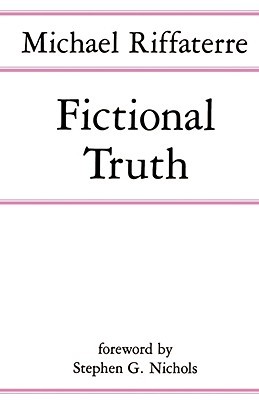
- We will send in 10–14 business days.
- Author: Michael Riffaterre
- Publisher: Johns Hopkins University Press
- ISBN-10: 0801839343
- ISBN-13: 9780801839344
- Format: 13.6 x 21.5 x 1.3 cm, minkšti viršeliai
- Language: English
- SAVE -10% with code: EXTRA
Reviews
Description
"All literary genres are artifacts", writes Michael Riffaterre, "but none more blatantly so than fiction. Its very name declares its artificiality, and yet it must somehow be true to hold the interest of its readers, to tell them about experiences at once imaginary and relevant to their own lives. This paradox of truth in fiction is the problem for which I propose to seek a solution."
In "Fictional Truth" Riffaterre identifies and discusses the features that give fictional narratives their ring of truth. He offers a semiotic revision of traditional narratology, sets forth a new theory of intertextual overdetermination, and presents an analysis of the manifestation of narrative content through the operations of an intertextual unconscious. Throughout, Riffaterre tests theory against close readings of fiction by such authors as Austen, Balzac, Dickens, James, Meredith, Proust, and Trollope. An introduction and glossary of terms help make this an indispensable volume for the students as well as the specialist.
EXTRA 10 % discount with code: EXTRA
The promotion ends in 22d.04:13:34
The discount code is valid when purchasing from 10 €. Discounts do not stack.
- Author: Michael Riffaterre
- Publisher: Johns Hopkins University Press
- ISBN-10: 0801839343
- ISBN-13: 9780801839344
- Format: 13.6 x 21.5 x 1.3 cm, minkšti viršeliai
- Language: English English
"All literary genres are artifacts", writes Michael Riffaterre, "but none more blatantly so than fiction. Its very name declares its artificiality, and yet it must somehow be true to hold the interest of its readers, to tell them about experiences at once imaginary and relevant to their own lives. This paradox of truth in fiction is the problem for which I propose to seek a solution."
In "Fictional Truth" Riffaterre identifies and discusses the features that give fictional narratives their ring of truth. He offers a semiotic revision of traditional narratology, sets forth a new theory of intertextual overdetermination, and presents an analysis of the manifestation of narrative content through the operations of an intertextual unconscious. Throughout, Riffaterre tests theory against close readings of fiction by such authors as Austen, Balzac, Dickens, James, Meredith, Proust, and Trollope. An introduction and glossary of terms help make this an indispensable volume for the students as well as the specialist.


Reviews